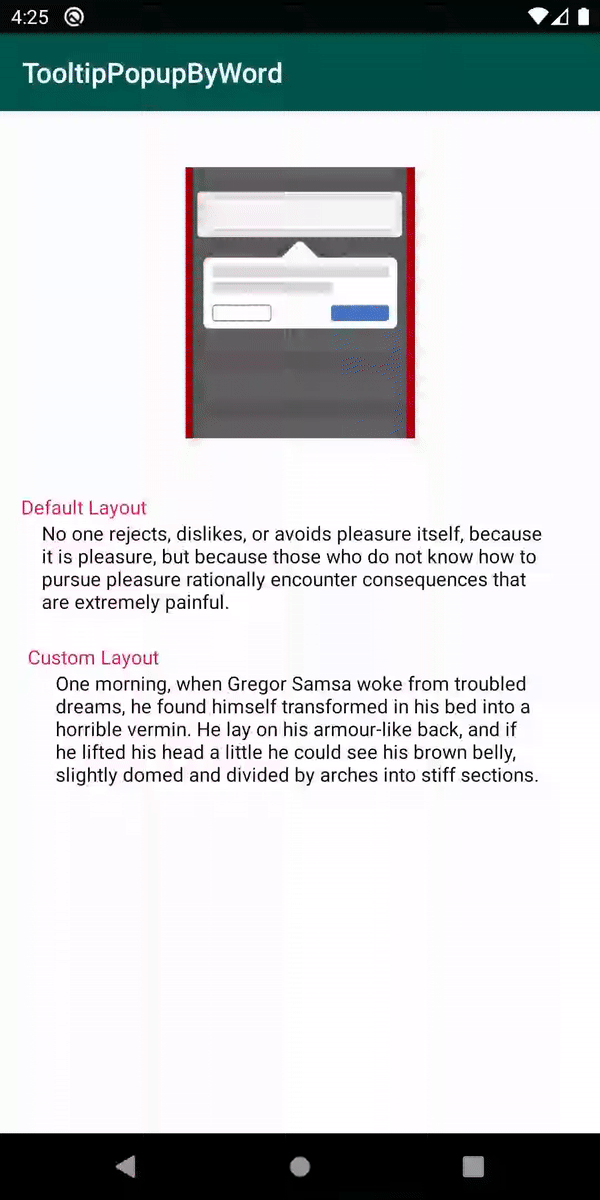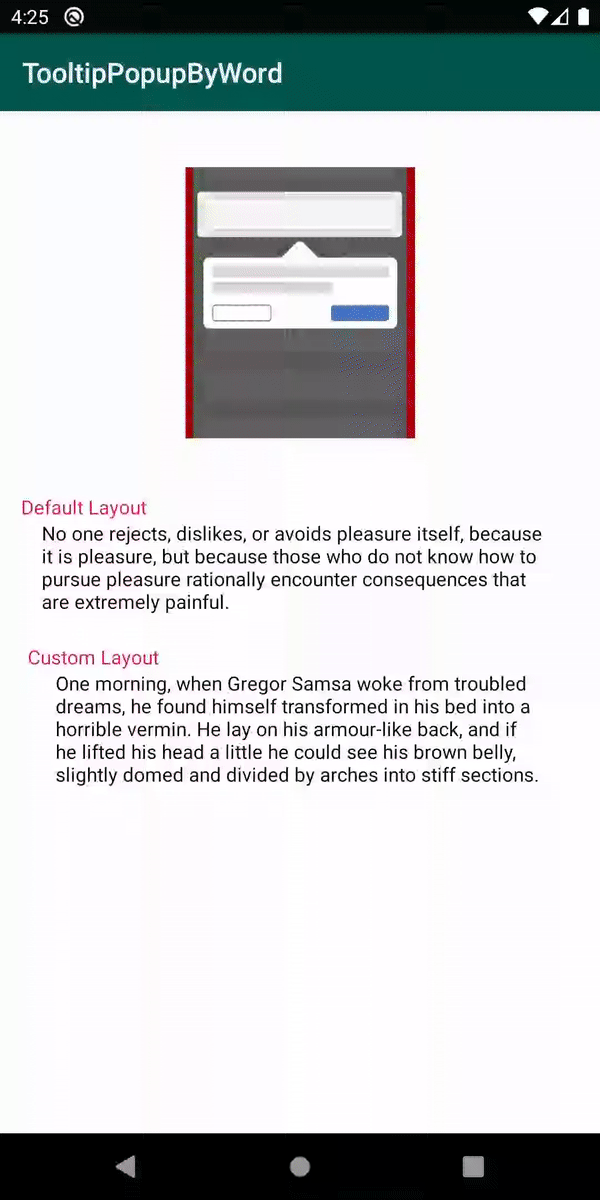A library that allows you to easily open a popup like tooltip

ooltipPopupWord
ToolTipopupWordTV is an Open Source Android library, that allows you to easily open a popup like tooltip, fully customizable, with details about selected word from your text.


Including in your project
Gradle
Add below codes to your root build.gradle file.
allprojects {
repositories {
...
maven { url 'https://jitpack.io' }
}
}
And add a dependency code to your module's build.gradle file.
dependencies {
implementation 'com.github.EusebiuCandrea:ToolTipPopupWordTV:1.0.1'
}
Features
- Selectable word from text;
- Show PopupWindow based on selected word;
- Customizable textsize, typeface, color, backround and alignment;
- Customizable ToolPopupWindows and Arrow
- Customized layout.
Custom attributes for SelectableWordTextView
| attribute name | attribute description |
|---|---|
| highlightBackgroundColor | The backround color of selected word. |
| highlightTextColor | The text color of selected word. |
| setUnderline | You can set a underline for selected word (true/false) |
Usage
Basic Example (Kotlin)
Firstly, you need to add this custom text view to the layout of the class, with custom attributes
<com.ecandrea.library.tooltipopwordtv.wordTextView.SelectableWordTextView
android:id="@+id/word"
android:layout_width="match_parent"
android:layout_height="wrap_content"
android:layout_gravity="center"
android:layout_margin="@dimen/space_30dp"
android:textColor="@color/colorPrimaryDark"
app:highlightBackgroundColor="@color/blue"
app:highlightTextColor="@color/white"
app:layout_constraintBottom_toBottomOf="parent"
app:layout_constraintLeft_toLeftOf="parent"
app:layout_constraintRight_toRightOf="parent"
app:layout_constraintTop_toTopOf="parent"
app:setUnderline="true" />
Here is a basic example of implementing ToolPopupWindows with a default layout using ToolPopupWindows.ToolTipBuilder class.
word.apply {
text = "Select a word from this example."
setToolTipListener(object : SelectableWordListeners {
override fun onWordSelected(anchorView: TextView, wordSelected: String, lineNumber: Int, width: Int) {
val toolPopupWindows = ToolPopupWindows.ToolTipBuilder(this@MainActivity)
.setToolTipListener { Toast.makeText(applicationContext, "dismissed", Toast.LENGTH_SHORT).show() }
.setTitleTextColor(ContextCompat.getColor(this@MainActivity, R.color.colorAccent))
.setTitleTextSize(20f)
.setBackgroundColor(ContextCompat.getColor(this@MainActivity, R.color.colorPrimary))
.setIsOutsideTouchable(false)
.setArrowCustomizer(...)
.build()
word.showToolTipWindow(anchorView, wordSelected, lineNumber, width, toolPopupWindows)
}
})
}
word.setBackgroundWordColor(ContextCompat.getColor(this, R.color.colorAccent))
Also, the arrow can be customized using an ArrowCustomizer.Builder class
ArrowCustomizer.Builder(this@MainActivity)
.setArrowColor(ContextCompat.getColor(this@MainActivity, R.color.colorAccent))
.setArrowSize(20)
.build()
Customized layout
We can fully customize the ToolPopupWindows layout using below method.
.setCustomLayout(R.layout.custom_layout)
This is an example of implementing custom ToolPopupWindows.
Firstly create an xml layout file like custom_layout.
val toolPopupWindows = ToolPopupWindows.ToolTipBuilder(this@MainActivity)
.setToolTipListener { Toast.makeText(applicationContext, "dismissed", Toast.LENGTH_SHORT).show() }
.setCustomLayout(R.layout.custom_layout)
.setAutoDismissDuration(1500)
.setIsOutsideTouchable(false)
.setArrowCustomizer(ArrowCustomizer.Builder(this@MainActivity)
.setArrowColor(ContextCompat.getColor(this@MainActivity, R.color.colorAccent))
.setArrowSize(20)
.build())
.build()
And next we can get the inflated custom layout using getCustomInflatedView method.
val inflatedView = toolPopupWindows.getCustomInflatedView()
inflatedView?.let {
it.newText.text = wordSelected
it.newDescription.text = "Press remove button to delete this word!"
it.testButton.setOnClickListener {
removedWord(anchorView, wordSelected, wordTwo)
toolPopupWindows.dismissTooltip()
}
}
:warning: If you didn't added your custom layout this method can return null
ToolPopupWindows.ToolTipBuilder methods:
.setWidthPercentsFromScreen(value: Double)
.setBackgroundColor(value: Int)
.setBackgroundDrawable(@DrawableRes value: Int)
setTextTitle(value: String)
.setToolTipDescription(value: String)
.setTitleTextColor(@ColorInt value: Int)
.setTitleTextColorResource(@ColorRes value: Int)
.setTitleTextTypeface(value: Int)
.setTitleTextSize(@Sp value: Float)
.setDescriptionTextColor(@ColorInt value: Int)
// same for description
.setCustomLayout(value: Int)
.setAutoDismissDuration(value: Long)
.setIsOutsideTouchable(value: Boolean)
.setToolTipListener(listener: ToolTipListeners)
.setArrowCustomizer(value: ArrowCustomizer)
.setToolTipListener(unit: () -> Unit)
.build()
ArrowCustomizer.Builder methods:
.setArrowDrawable(value: Drawable?)
.setArrowDrawableResource(@DrawableRes value: Int)
.setArrowSize(@Px value: Int)
.setArrowColor(@ColorInt value: Int)
.setArrowColorResource(@ColorInt value: Int)
.setArrowVisibility(isVisible: Boolean)
.build()
Find this library useful?
Be free to use it and enjoy.